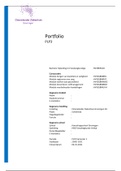Samenvatting
Summary Mercantile Law 292
- Vak
- Instelling
This summary provides comprehensive notes of the work to be covered in your second year Mercantile Law 292 class with sufficient information for test and exam preparation. The summary also contains all section references to the Companies Act for convenience when highlighting your Act.
[Meer zien]








